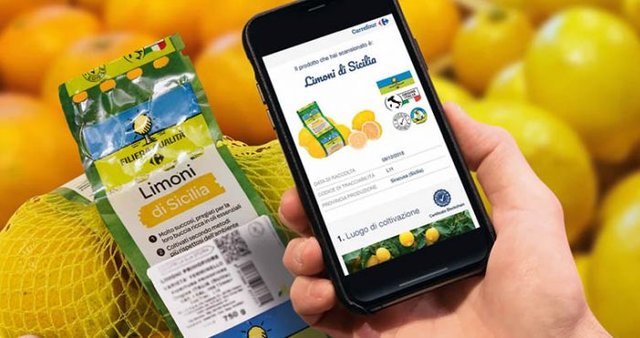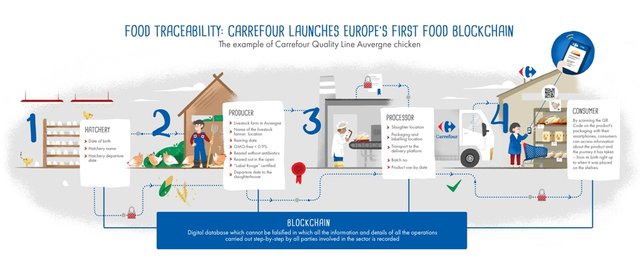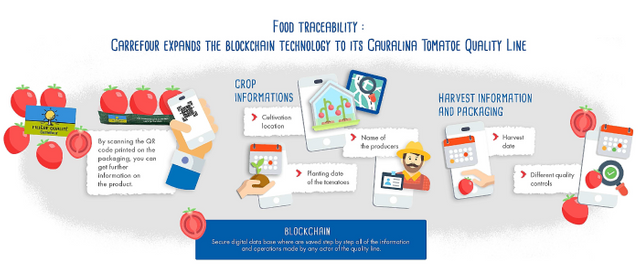Blockchain and the Food Industry, a Practical Revolution

Great news in the Blockchain world today. Carrefour, the retail giant has revealed that they registered a substantial sales boost following their recent implementation of Blockchain technology.
For those not familiar with the story, Carrefour launched a food tracking system on the blockchain back in March. The idea behind that is to provide transparency, and to give the information and power back to the customers as in where their food comes from.
This traceability, ensures that the consumers can track down not only the origins of where the food was produced, processed or distributed.. But also the dates they were produced.

As we all know, it is not uncommon for big chains to change the dates on certain food items, or even hide where it came from (Monsanto anyone?).
In addition to that, the blockchain offers another layer of insurance against food producers piggybacking on trendy words. Anywhere from affirming their eggs are free range or using the word “Organic” all too loosely.
What ramifications could this have on Big Agra and the likes? That remains to be seen, but one thing is sure is that this initiative could open the door to small farmers who are actually producing quality food.
The scale is important as well as Carrefour operates in dozens of countries across four continents, and while this project has launched in Europe first, one could expect to see the same thing taking place in some of their other stores abroad.
And lastly, the blockchain revolutions goes on!

Blockchain doesn’t solve any issues with produce, the information can simply be entered incorrectly or dishonestly. The argument that they can not change the data is also mute, all they need to do is own the chain. Unless reputable third parties are publishing audits to a serious blockchain, like bitcoin’s, this is all buzzword marketing nonsense. Might as well claim to use AI and solar electricity while you’re at it.
These are good points. You can also bribe the inspectors and a variety of other ways. Everything can be gamed, but acknowledging that fact, doesn't necessarily mean that no actions should be taken.
It's like when they say that a fence turns off 50% of thieves. Technically everybody can jump over a fence, or if we continue in the same lines, thieves can wear a mask so security cameras as useless, or that people can learn how to deactivate alarm systems..etc.
Technically, everything can be gamed. But should that mean that we shouldn't take any measures unless it's a system that guarantees 100% success and 0% chances of being gamed? I think that's the question.
Very interesting points btw. People can just enter the data incorrectly, but then what happens when they get caught during inspections?
I mean if they get Monsanto's giant farm pretending to be a tiny local farm... I'd love to see them trying to justify that haha
I bet they wouldn’t get caught entering information incorrectly. It’s the same as all the mislabeled organic produce that gets sold today. Blockchain isn’t a savior technology. There must be economic gain for honest participation. The idea Blockchain is best implemented in one project alone, Bitcoin. The miners are incentivized to be honest.
Give it a shot, but, as a consumer, I wouldn’t put any extra trust in a product that uses buzzwords for sales.
Posted using Partiko iOS